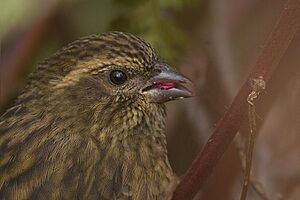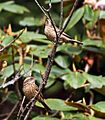Pink-browed rosefinch facts for kids
Quick facts for kids Pink-browed rosefinch |
|
|---|---|
 |
|
| Male from Nanda Devi National Park, Uttarakhand, India |
|
 |
|
| Female from Pangolakha Wildlife Sanctuary, Sikkim, India |
|
| Conservation status | |
| Scientific classification | |
| Genus: |
Carpodacus
|
| Species: |
rodochroa
|
| Synonyms | |
|
|
The pink-browed rosefinch (Carpodacus rodochroa) is a beautiful small bird. It belongs to the finch family, which includes many types of songbirds. This bird was first described in 1831.
These rosefinches are known for their bright colors. They travel long distances, moving between different areas depending on the season. You can find them mainly in the Himalayas, a huge mountain range in Asia. Their home countries include Bhutan, Tibet, India, Nepal, and Pakistan.
Pink-browed rosefinches live in various places. They like forests, bushy areas, grasslands, and dry woodlands. The males are a striking raspberry pink, especially around their "eyebrows." Females are mostly brown with streaks, but they also have clear white eyebrows. This bird's population is stable, so it's not in danger of disappearing.
Contents
What the Pink-browed Rosefinch Looks Like
The pink-browed rosefinch is a medium-sized bird. It's usually about 14 to 15 centimeters long. This is roughly the length of a pen. It weighs around 16 to 20 grams, which is very light.
This bird has a slim body and a pointy beak. Its tail is slightly curved inward. It also has bright black eyes.
Male Rosefinch Appearance
Male rosefinches are very colorful. They are a bright raspberry pink color. They have a special pattern around their eyes that looks like "eyebrows."
Their lower body is a reddish-brown color. The chest and upper belly are a soft purplish-pink. From the lower belly to under the tail, their feathers are white or light pink. Their legs are a pale brown.
Female Rosefinch Appearance
Female rosefinches look different from the males. They usually don't have much pink color. Instead, they are a mix of streaky brown or blackish colors. They might have only a few light streaks of pale pink.
The back of their neck and head are a darker gray. Unlike the males, females have clear white eyebrows. Their tail is dark brown. You can also see dark brown streaks on their lower throat.
Young Rosefinch Appearance
Young pink-browed rosefinches look more like females. When they are young, they are mostly brown, not pink. As they get older, young males start to show some reddish-brown on their upper parts. They might also have a little pale pink. However, their underparts will still have heavy dark streaks.
Where They Live and Travel
The pink-browed rosefinch lives in many different places. These include forests, areas with shrubs, and open grasslands. They can also be found in places changed by humans.
Their home stretches across South and East Asia. This includes countries like Bhutan, China, India, Nepal, and Pakistan. These birds can live at many different heights. They are found as high as 4,540 meters (about 14,900 feet). They can also live as low as 1,800 meters (about 5,900 feet).
Migration and Movement
The pink-browed rosefinch population is stable. This means their numbers are not going down. They are not considered in danger of extinction.
These birds make short trips during the year. They move between lower and higher mountains depending on the season. This is called a short-distance migration.
Reproduction and Life Cycle
Pink-browed rosefinches usually breed in July and August. The female bird builds the nest. She uses small twigs, dry plant stems, and fibers. She also adds grass, moss, and animal hair to make it cozy.
A female usually lays about 4 to 5 eggs. These eggs are a pretty turquoise-blue color. They might be plain, or have light spots, or thin lines of black or reddish-brown. The female bird sits on the eggs to keep them warm until they hatch.
Behavior and Sounds
The pink-browed rosefinch has a special song. They often sing from the top of bushes or low trees. Their song is a series of loud whistles. These whistles go up in tone, sounding like "toowhi toowhi."
They also make different calls. Some calls sound like a loud "per-lee" or "chew-wee." They can also make a "sweet" sound. This sound is similar to the song of an Atlantic canary.
What They Eat
Pink-browed rosefinches have interesting ways of finding food. They eat different types of plants. Some plants they like are Cyathula, Viburnum, and Ziziphus Mauritiana.
They usually find their food on the ground. They move around by hopping or shuffling. They also seem to like looking for food near the edges of melting snow patches. This shows how well they are suited to finding food in their mountain homes.
Gallery








